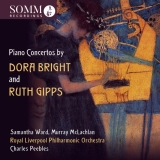 Dora Bright: Piano Concerto No. 1 + Variations for Piano and Orchestra; Ruth Gipps: Piano Concerto op. 34 + Ambarvalia op. 70; Samantha Ward, Murray McLachlan, Klavier, Royal Liverpool Philharmonic Orchestra, Charles Peebles; 1 CD Somm 0273; Aufnahme 04/2019, Veröffentlichung 09/2019 (UK, US), 11/2019 (D) - (75'22) - Rezension von Remy Franck
Dora Bright: Piano Concerto No. 1 + Variations for Piano and Orchestra; Ruth Gipps: Piano Concerto op. 34 + Ambarvalia op. 70; Samantha Ward, Murray McLachlan, Klavier, Royal Liverpool Philharmonic Orchestra, Charles Peebles; 1 CD Somm 0273; Aufnahme 04/2019, Veröffentlichung 09/2019 (UK, US), 11/2019 (D) - (75'22) - Rezension von Remy Franck
Die englische Pianistin und Komponistin Dora Bright (1862-1951) komponierte angeblich recht viel, auch fürs Musiktheater und das Ballett, aber viele ihrer Kompositionen sind verschollen. Bright, zu der Liszt sagte « Mademoiselle, vous jouez à merveille », komponierte ihr Klavierkonzert 1891. Es ist ein romantisches Werk mit vielen originellen Ideen, sehr angenehm zu hören. Samantha Ward spielt es brillant und stimmungsvoll, vorzüglich begleitet vom Orchester aus Liverpool unter Charles Peebles. Auch die von Murray McLachlan gespielten Variations for Piano and Orchestra sind kunstfertig und abwechslungsreich.
Das Klavierkonzert der britischen Komponistin Ruth Gipps (1921-1999) ist ebenfalls interessant, wenn auch nicht ganz so gefällig wie das von Bright. Das liegt daran, dass die Komponistin sehr von ihrem Lehrer Vaughan Williams beeinflusst wurde und eine etwas pathetischere Sprache benutzt, auch wenn es durchaus
leichtere und lyrischere Passagen in dem Konzert gibt. McLachlan musiziert phantasievoll. Das schöne, pastorale Stück Ambervalia von Ruth Gipps beschließt dieses CD-Programm.
The English pianist and composer Dora Bright (1862-1951) apparently composed quite a lot, also for music theatre and ballet, but many of her compositions are lost. She wrote her Piano Concerto in 1891. It is a romantic work with many original ideas, very pleasant to listen to. Samantha Ward’s playing is brilliant and atmospheric, and she is excellently accompanied by the Royal Liverpool Philharmonic under Charles Peebles. The Variations for Piano and Orchestra played by Murray McLachlan are a lovely piece too.
The Piano Concerto by the British composer Ruth Gipps (1921-1999) is also interesting, although not quite as attractive as the Bright Concerto. Gipps was very much influenced by her teacher Vaughan Williams and uses a more pathetic language, even though it contains also some light and lyrical passages. McLachlan’s committed playing serves the music very well.
The program ends with the beautiful pastoral piece Ambervalia by Ruth Gipps.






















